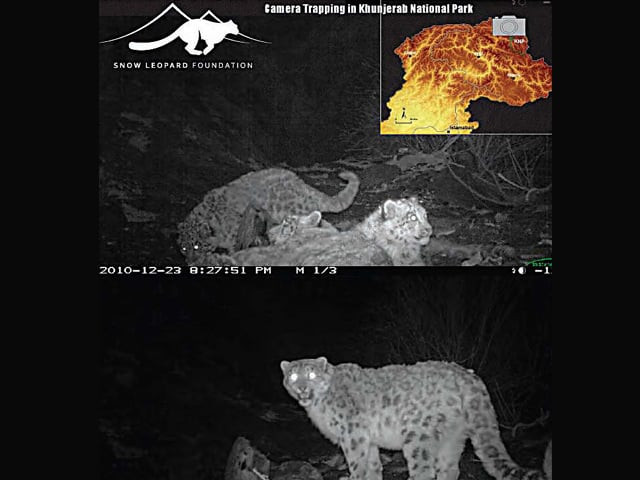Imperiled phantom: Rare group photo of snow leopards at Khunjerab Park
Three snow leopards were snapped in a single shot at the Khunjerab National Park (KNP).

The study was being conducted by the Snow Leopard Foundation (SLF) Pakistan in collaboration with the directorate of KNP and the forest and wildlife department of Gilgit-Baltistan.
A spokesperson for the SLF told The Express Tribune that a total of 643 photographs including one with three snow leopards (probably 2 sub-adults with a mother) were taken during an intensive camera trapping session last month. He said that the cameras captured many other wild species as well during these sessions.
He said that the study was aimed at assessing the status of snow leopards as well as other carnivores, their key prey species and the human-carnivore conflict. The study also tested the effect of different kinds of baits on camera trapping success.
In addition to camera trapping an area greater than 1, 400 square kilometres was scanned during occupancy surveys and 150 faecal samples were collected for genetic analysis.
The study provided a rare learning opportunity to the staff of the wildlife department and students from national and international universities, who were engaged in this venture, he said.
Once data analysis is completed, the study will provide more reliable estimates of snow leopards in the park besides highlighting existing management and monitoring limitations. This will ultimately help in better managing park resources in the long run. Panthera provided financial support for this study.
The spokesperson said that the snow leopards are cryptic in nature and reside in one of the harshest and most inaccessible milieus of our planet. Encountering snow leopards in the wild is like a dream, he added. This elusive nature of the creature has led to it being labelled as the “Imperiled Phantom” by eminent wildlife biologists.
The Snow Leopard Foundation is a non-profit organisation dedicated to conserving viable populations of snow leopards and other wild carnivores. The creatures are considered to be an integral part of landscapes across Pakistan. The organisation also strives to improve the socio-economic conditions of people who share the fragile mountain ecosystem with the wildlife. The SLF works in partnership with the Snow Leopard Trust and Panthera, the two leading international wildcat conservation organizations. The SLF operates in three core sectors: research and monitoring, community based conservation programmes and conservation education and awareness. It has pioneered state-of-the-art research tools in Pakistan while operating in Gilgit-Baltistan, Khyber-Pakhtunkhwa and Azad Jammu and Kashmir.
Published in The Express Tribune, January 14th, 2011.



















COMMENTS
Comments are moderated and generally will be posted if they are on-topic and not abusive.
For more information, please see our Comments FAQ